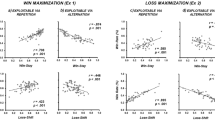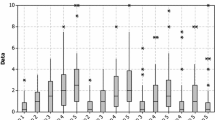Abstract
Previous research has provided evidence that an individual's need for a chance-based outcome positively affects perceptions of the skill involved in attaining the outcome as well as certainty of winning. Two experiments were conducted to test several competing alternative interpretations for this effect. In Experiment 1, food-satiated (low-need) and food-deprived (high-need) subjects were given the opportunity to win a food incentive in a chance-based card-drawing game either in the presence or absence of situational cues previously shown to induce skill orientations. Skill and confidence-in-winning ratings were found to be positive function of outcome need regardless of the cues condition, thus not supporting an attentional or vigilance interpretation of the general effect. In Experiment 2, food-satiated and food-deprived subjects faced a similar card-drawing game, but this time were given the opportunity to choose whether or not they wanted to be personally involved in various facets of the game (e.g., shuffling the cards). As predicted, high-need subjects showed a greater propensity to want to be personally involved in playing the game, a finding offering support for a “control” interpretation. Overall results are discussed in terms of control theory.
Similar content being viewed by others
REFERENCES
Alloy, L. B., & Abramson, L. Y. (1979). Judgements of contingency in depressed and nondepressed students: Sadder but wiser? Journal of Experimental Psychology: General, 108, 441–485.
Biner, P. M., Angle, S. T., Park, J. H., Mellinger, A. E., & Barber, B. C. (1995). Need state and the illusion of control. Personality and Social Psychology Bulletin, 21, 899–907.
Biner, P. M., & Hua, D. M. (1995). Determinants of the magnitude of goal valence: The interactive effects of need, instrumentality, and the difficulty of goal attainment. Basic and Applied Social Psychology, 16, 53–74.
Bouts, P., & Van Avermaet, E. (1992). Drawing familiar or unfamiliar cards: Stimulus familiarity, chance orientation, and the illusion of control. Personality and Social Psychology Bulletin, 18, 331–335.
Burger, J. M. (1985). Desire for control and achievement-related behaviors. Journal of Personality and Social Psychology, 48, 1520–1533.
Burger, J. M. (1986). Desire for control and the illusion of control: The effects of familiarity and sequence of outcomes. Journal of Research in Personality, 20, 66–76.
Burger, J. M., & Schnerring, D. A. (1982). The effects of desire for control and extrinsic rewards on the illusion of control and gambling. Motivation and Emotion, 6, 329–335.
Dunkling, L., & Gosling, W. (1984). The facts on file dictionary of first names. New York: Facts on File Publications.
Dunn, D. S., & Wilson, T. D. (1990). When the stakes are high: A limit to the illusion-of-control effect. Social Cognition, 8, 305–323.
Dykstra, S. P., & Dollinger, S. J. (1990). Model competence, depression, and the illusion of control. Bulletin of the Psychonomic Society, 28, 235–238.
Fiske, S. T., & Taylor, S. E. (1984). Social cognition. Reading, MA: Addison-Wesley.
Fleming, J. H., & Darley, J. M. (1990). The purposeful-action sequence and the illusion of control: The effects of foreknowledge and target involvement on observers' judgments of others' control over random events. Personality and Social Psychology Bulletin, 16, 346–357.
Friedland, N., Keinan, G., & Regev, Y. (1992). Controlling the uncontrollable: Effects of stress on illusory perceptions of controllability. Journal of Personality and Social Psychology, 63, 923–931.
Gilovich, T., & Douglas, C. (1986). Biased evaluations of randomly determined gambling outcomes. Journal of Experimental Social Psychology, 22, 228–241.
Gollwitzer, P. M., & Kinney, R. F. (1989). Effects of deliberative and implemental mind-sets on the illusion of control. Journal of Personality and Social Psychology, 56, 531–542.
Griffiths, M. D. (1990). The cognitive psychology of gambling. Journal of Gambling Behavior, 6, 31–42.
Irwin, F. W. (1953). Stated expectations as functions of probability and desirability of outcomes. Journal of Personality, 21, 329–335.
Kanfer, R. (1990). Motivation theory and industrial and organizational psychology. In M. D. Dunette & L. Hough (Eds.), Handbook of industrial and organizational psychology (2nd ed., Vol. 2, pp. 75–170). Palo Alto, CA: Consulting Psychologists Press.
Langer, E. J. (1975). The illusion of control. Journal of Personality and Social Psychology, 32, 311–328.
Langer, E. J., & Roth, J. (1975). Heads I win, tails it's chance: The illusion of control as a function of the sequence of outcomes in a purely chance task. Journal of Personality and Social Psychology, 32, 951–955.
Marks, R. W. (1951). The effect of probability, desirability, and “privilege” on the stated expectations of children. Journal of Personality, 19, 332–351.
Mitchell, T. R. (1982a). Expectancy-value models in organizational psychology. In N. T. Feather (Ed.), Expectations and actions: Expectancy-value models in psychology (pp. 293–312). Hillsdale, NJ: Erlbaum.
Mitchell, T. R. (1982b). Motivation: New directions for theory, research, and practice. Academy of Management Review, 7, 80–88.
Nisbett, R. E., & Ross, L. (1980). Human inference: Strategies and shortcomings of social judgment. Englewood Cliffs, NJ: Prentice-Hall.
Pinder, C. C. (1991). Valence-instrumentality-expectancy theory. In R. M. Steers & L. W. Porter (Eds.), Motivation and work behavior (pp. 144–164). New York: McGraw-Hill.
Pruitt, D. G., & Hoge, R. D. (1965). Strength of the relationship between the value of an event and its subjective probability as a function of method of measurement. Journal of Experimental Psychology, 69, 483–489.
Stahl, M., & Harrell, A. (1981). Modeling effort decisions with behavioral decision theory: Toward an individual difference model of expectancy theory. Organizational Behavior and Human Performance, 27, 303–325.
Taylor, S. E., & Brown, J. D. (1988). Illusion and well-being: A social psychological perspective on mental health. Psychological Bulletin, 103, 193–210.
Vroom, V. (1964). Work and motivation. New York: Wiley.
Wanous, J. P., Keon, T. L., & Latack, J. C. (1983). Expectancy theory and occupational/organizational choices: A review and test. Organizational Behavior and Human Performance, 32, 66–86.
Author information
Authors and Affiliations
Corresponding author
Rights and permissions
About this article
Cite this article
Biner, P.M., Huffman, M.L., Curran, M.A. et al. Illusory Control as a Function of Motivation for a Specific Outcome in a Chance-Based Situation. Motivation and Emotion 22, 277–291 (1998). https://doi.org/10.1023/A:1021300306318
Issue Date:
DOI: https://doi.org/10.1023/A:1021300306318




